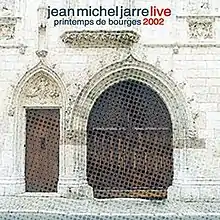Live Printemps de Bourges 2002
Live Printemps de Bourges 2002 contains four previously unreleased live tracks from Jean-Michel Jarre's performance at the Printemps de Bourges Music Festival in Bourges, France on 12 April 2002, which Jean-Michel Jarre performed to 100 invited guests.
| Live Printemps de Bourges 2002 | ||||
|---|---|---|---|---|
 | ||||
| Live album by | ||||
| Released | 20 March 2006 | |||
| Recorded | 12 April 2002 | |||
| Genre | Electronic | |||
| Length | 46:11 | |||
| Label | iTunes | |||
| Producer | Jean-Michel Jarre | |||
| Jean-Michel Jarre chronology | ||||
| ||||
The live album features Jarre's entire 'Audio Brunch' performance in the Palais Jacques-Cœur in Bourges, France, which sees Jarre and Francis Rimbert, mixing and improvising live, a unique and experimental set.
The album was released exclusively on Apple's online iTunes Store as AAC files.
Track listing
- "Alive in Bourges" – 23:35
- "Metallic Souvenir" – 6:37
- "Body Language" – 4:41
- "Paris Bourges" – 11:24
Track information
The track "Alive in Bourges", originally titled "Bourges 2" at the performance, was later reworked and performed by Jarre and Danish Band Safri Duo as "AERO" (not to be confused with "AERO" on Jean Michel Jarre's AERO album), at the AERO Concert in the Gammel Vraa Enge Windmill Park, Aalborg, Denmark on 7 September 2002.
The track "Metallic Souvenir", originally written in 1969, was titled "AOR (Bleu) 2002" at the performance, and was originally performed as "Bleu", as part of Jean Michel Jarre's Music Score for the Opera AOR, at the Opéra De Paris, Palais Gardnier, Paris, France on 21 October 1971.
The track "Body Language", originally written for Jarre's Métamorphoses album, was titled "Metamorphoses 2002" at the performance, and originally titled "Crazy Saturday". Despite being never released, the track has appeared on a Bang & Olufsen commercial, and on a video installation at the Global Tekno Festival in Avignon, France in 2000.
The track "Paris Bourges", originally titled "Bourges 1" at the performance, features Jarre performing live on one of the world's oldest electronic musical instruments, the Theremin, invented by the Russian physicist, Lev Sergeivich Termen (Léon Theremin), in 1919.
